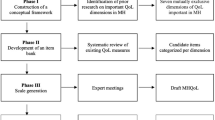Abstract
Subjective well-being is a major aspect of quality of life and is therefore increasingly used as an endpoint in clinical trials. It is influenced to a great extent by the complex process of coping with the disease and its treatment. Assessment of coping is methodologically demanding, especially in large clinical trials. We therefore developed a single-item measure, the Perceived Adjustment to Chronic Illness Scale (PACIS), as an indicator of coping, complementary to other scales related to quality of life. We sought to validate this instrument in a subgroup of 121 Swiss patients participating in the International Breast Cancer Study Group (IBCSG) adjuvant trials. At months 3 and 6 of adjuvant treatment PACIS showed a distinct pattern of highly significant rank correlations with several disease-and treatment-related problem areas from the Herschbach coping inventory (FBBK); 42% of the variance of PACIS at month 3 was explained by the FBBK (P=0.0001). The portion of explained variance was considerably higher for the Italian-(70%) than for the German-speaking (30%) subgroups. Patients who rated more effort to cope with their disease on PACIS indicated more frequent use of 3 of 15 coping strategies in relation to psychological distress. These were “crying and becoming desperate”, “taking tranquillizers and alcohol” and “other people are far worse off”. These three coping strategies may define a high-risk group for poor psychosocial outcome. Patients whose PACIS scores showed that it required less effort to cope tended to use the strategy “seeing a positive side of the problem”. We conclude that PACIS can be used as a global indicator of the coping process in large multicultural clinical trials of adjuvant therapy for breast cancer.
Similar content being viewed by others
References
Aaronson NK, Ahmedzai S, Bullinger M, et al, for the EORTC Study Group on Quality of Life (1991) The EORTC core quality-of-life questionnaire: interim results of an international field study. In: Osoba D (ed) Effect of cancer on quality of life. CRC Press, Boca Raton, Fla, pp 185–203
Beutel M (1988) Bewältigungsprozesse bei chronischen Erkrankungen. Edition Medizin, Weinheim, pp 33–52
Butow P, Coates A, Dunn S, et al (1991) On the receiving end. IV. Validation of quality of life indicators. Ann Oncol 2:597–603
Cassileth BR, Lusk EJ, Miller DS et al (1985) Psychological correlates of survival in advanced malignant disease? N Engl J Med 312:1551–1555
Cassileth BR, Walsh WP, Lusk EJ (1988) Psychosocial correlates of cancer survival: a subsequent report 3 to 8 years after cancer diagnosis. J Clin Oncol 6:1753–1759
Gotay C (1985) Why me? Attributions and adjustment by cancer patients and their mates at two stages in the disease process. Soc Sci Med 20:825–831
Heim E (1991) Coping and adaptation in cancer. In: Cooper CL, Watson M (eds) Cancer and stress, Psychological, biological and coping studies. Wiley, New York, pp 197–235
Herschbach P (1985) Psychosoziale Probleme und Bewältigungsmöglichkeiten bei Brust-und Genitalkrebspatienten. Röttger, München
Herschbach P, Henrich G (1987) Probleme und Problembe-wältigung von Tumorpatienten in der stationären Nachsorge. Psychother Med Psychol 37:185–192
Hürny C, Bernhard J (1988) Coping and survival in patients with primary breast cancer: a critical analysis of current research strategies and proposal of a new approach integrating biomedical, psychological and social variables. Recent Results Cancer Res 115:255–271
Hürny C, Bernhard J, Pampallona S, et al, for the International Breast Cancer Study Group (IBCSG) (1991) The perceived adjustment to chronic illness scale (PACIS): a global indicator of coping of operable breast cancer patients for clinical trials. In: Holland JC (ed) Current concepts in psy-cho-oncology. IV. Syllabus of the postgraduate course. Memorial Sloan-Kettering Cancer Center, New York, p 235
Hürny C, Bernhard J, Peterson H, et al, for the International Breast Cancer Study Group (IBCSG) (1992) Psychosocial predictors of survival in stage II breast cancer patients: a preliminary analysis. Abstract book for the International Conference on Adjuvant Therapy of Primary Breast Cancer, St Gallen 1992, p 93
Hürny C, Bernhard J, Gelber RD, et al for the International Breast Cancer Study Group (IBCSG) (1992) Quality of life measures for patients receiving adjuvant therapy for breast cancer: an international trial. Eur J Cancer 28:118–124
Kneier AW, Temoshok C (1984) Repressive coping reactions in patients with malignant melanoma as compared to cardiovascular disease patients. J Psychosom Res 28:154–155
Liang MH, Larson MG, Cullen KE, et al (1985) Comparative measurement efficiency and sensitivity of five health status instruments for arthritis research. Arthritis Rheumatism 28:542–547
Rahe RH (1974) The pathway between subjects' recent life changes and their near-future illness reports: representative results and methodological issues. In: Dohrenwend BS, Dohrenwend BP (eds) Stressful life events: their nature and effects. Wiley, New York, pp 73–87
Rahe RH (1975) Epidemiological studies of life change and illnness. Int J Psychiatry Med 6:133–146
Rogentine GN, Kammen DP v, Fox BH, et al (1979) Psychological factors in the prognosis of malignant melanoma: a prospective study. Psychosom Med 41:647–655
SAS-STAT User's Guide and Statistics (1990) Version 6. SAS Institute, Cary, NC
Spilker B (1990) Quality of life assessments in clinical trials. Raven Press, New York
Spitzer WO, Dobson AJ, Hall J et al (1981) Measuring the quality of life of cancer patients: a concise QL-index for use by physicians. J Chronic Dis 34:585–597
Author information
Authors and Affiliations
Consortia
Rights and permissions
About this article
Cite this article
Hürny, C., Bernhard, J., Bacchi, M. et al. The Perceived Adjustment to Chronic Illness Scale (PACIS): a global indicator of coping for operable breast cancer patients in clinical trials. Support Care Cancer 1, 200–208 (1993). https://doi.org/10.1007/BF00366447
Issue Date:
DOI: https://doi.org/10.1007/BF00366447




